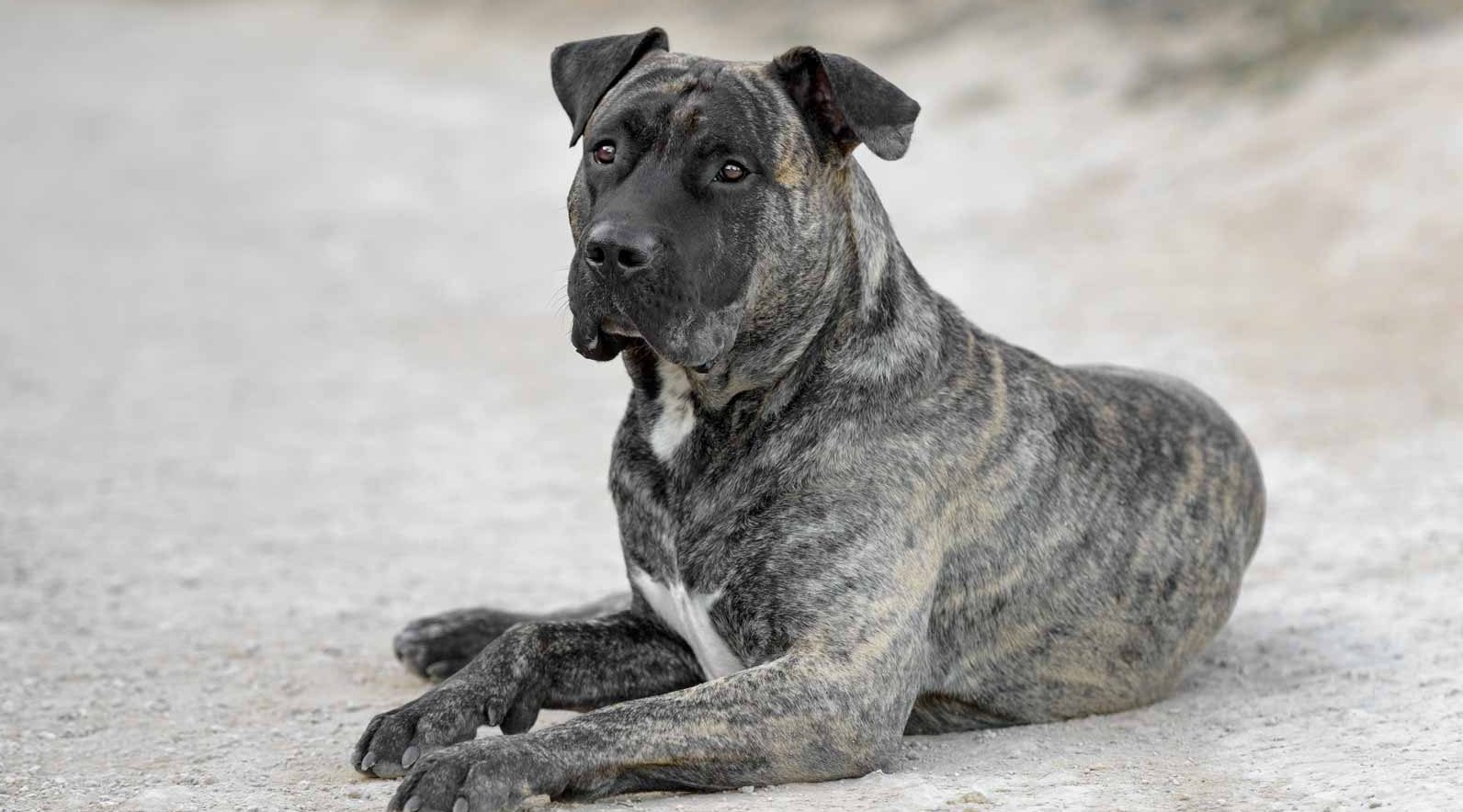-
Activity Level:
moderate
-
Shedding Level:
moderate
-
Grooming Level:
low
-
Trainability:
low
-
Good for Novice Owners:
low
-
Adaptability:
moderate
-
Kid/Pet Friendly:
sometimes
-
Prey Drive:
high
-
Watchdog:
aware
- Average Size: Large
- Average Lifespan: 9-11 years
- Registered?: aca, akc
Presa Canario Dog Breed Information
Overview
Temperament
Adaptability
Health
Owner Experience
Grooming
Activity Level
Size
Life Span
Did You Know?
The Presa Canario, also called the Perro de Presa Canario, Canary Mastiff, Dogo Canario, or Canary Presa, is a Molosser-type breed that originated in the Canary Islands in the 15th and 16th centuries. Although their exact origin is unknown, many theorize that the dogs may have been brought to the Canary Islands by Spanish Conquistadors, may have existed there already, or their origin may have been a mixture of both. However the Presa Canario ended up in the Islands, they were used as guard dogs. They were commonly used as cattle dogs, guard dogs for the farm, and as dogs to control the wild or stray dog population that would attack cattle.
Unfortunately, this also meant the Presa Canario was also often used in dogfighting. Their population dwindled once the Canary Islands outlawed dog fighting in the mid-1940s, but farmers and herdsman kept the dog breed going. In the early 1970s, breeders began to work in earnest to revive this strong dog breed. Although the Presa Canario is not currently recognized by the AKC, they are included in the Foundation Stock Service and are assigned to the Working Group designation.
Presa Canarios tend to be calm and confident. They are affectionate, obedient, and docile with their families, but can be suspicious and wary of strangers. They can get along well with older children who know how to properly interact with a dog and are large enough to not get knocked over by the Presa’s wagging tail. They can also do well with other dogs and pets in the household as long as they have been introduced properly.
Although they were used for fighting in the past, the Presa Canario is not a naturally aggressive dog. As a guard dog and protector, they can become aggressive when protecting themselves, their family, or their territory. This does make early and ongoing socialization and training important to this dog breed. They do have a high prey drive, so will have an urge to chase.
They are very loyal and protective companions. Although this is a large dog breed, they can adapt well to apartment living. They also do well in larger homes with fenced-in yards. They do well in most climates, but are sensitive to the extremes. They handle heat better than other Mastiff-type dogs, but they may also be a little more sensitive to the cold than dog breeds with a thicker coat. It’s also not a good idea to leave this dog alone for long periods of time as they can become destructive if they are not given enough exercise or kept mentally stimulated.
The Presa Canario is a relatively healthy dog breed. As a large dog breed, some health conditions to be aware of include hip dysplasia, elbow dysplasia, patellar luxation, epilepsy, skin cysts, and heart problems. Reputable breeders will screen their stock to avoid passing genetic issues on to puppies, so don’t be afraid to ask about the history of the parents and to see any relevant health clearances or test results.
Although this dog is intelligent and picks up things quickly, they are strong-willed and independent. They are not generally a good fit for first-time dog owners or for owners who don’t have experience with larger, stubborn dog breeds. The Presa Canario needs early and ongoing socialization and training. They also need a dog owner who can establish themselves as a leader and train them with a firm, consistent hand without harsh corrections.
The Presa Canario’s coat is short and low-maintenance. They will shed moderately year-round and only require a weekly brushing and the occasional bath. In addition to coat care, you will also need to care for your Presa Canario’s nails, ears, and teeth.
Usually, monthly nail trimming is sufficient to keep your dog’s nails from getting too long and causing discomfort. The Presa Canario’s nails do tend to grow fast, so they may need to be trimmed more often. If you hear your dog’s nails clicking on the floor, it’s time for a trim. If your dog shows a consistent aversion to the nail clippers, you can try a grinder instead to help prevent overgrowth.
It’s also important to check your dog’s ears on a weekly basis to make sure they are clean, dry, and free of debris. Checking their ears regularly and carefully cleaning them can help prevent ear infections and ensure that you catch anything that might be starting early.
Dental diseases, like gum disease and tooth decay, are one of the most common health issues in dogs. They’re also one of the most preventable. By implementing proper dental care for dogs, like brushing their teeth or using an enzyme toothpaste every day, you can help prevent the tartar and plaque buildup that leads to painful dental disease.
Although the Presa Canario is a working dog, they have a more moderate activity level. Daily walks plus some extra activity will be plenty for this dog, but they do need a job to do. Playtime inside or outside, going on a hike with you, swimming, and more can all be good ways to give your Presa Canario enough exercise. They can also be a good candidate for dogs sports! Because they have a guard dog background and a prey drive, they should only be let off-leash in a securely fenced area.
A fully-grown Presa Canario usually stands 22-26 inches tall at the shoulder and weighs 84-110 pounds.
A Presa Canario generally lives 9-11 years.
The Presa Canario is the animal symbol of Gran Canaria, which is the second-most populous island of the Canary Islands.
Featured Presa Canario Article
Presa Canario Puppies for Sale


Thanks for visiting our
Presa Canario page!
Currently, we do not have any Presa Canario puppies available, but we can alert you when new Presa Canario puppies are available!
Just enter your email address and click submit!

Presa Canario dog?
Share your thoughts on this breed with us!
"*" indicates required fields





